How To Move Your LEGO Collection
Moving a cherished LEGO collection can be a daunting task for even the most seasoned AFOLs (Adult Fans of LEGO). In this article, we'll delve into a LEGO fan’s potentially greatest struggle: relocating their beloved LEGO creations and collection. While there's no magical formula to make this process entirely seamless, we'll explore some valuable insights, stories, and practical tips to help mitigate the challenges and preserve your precious creations intact.

BrickNerd has previously discussed how to fly with MOCs and how to store your collection of pieces, but how do you move it all when life makes you take a different direction? Whether moving to a new house, rearranging rooms, or embarking on an international move, read on to glean insights from personal experiences and expert advice.
Embracing the Challenge
If you're expecting a quick fix or foolproof solution for relocating your LEGO collection, I must disappoint you. The reality is that moving LEGO—be it within a house or across continents—is inherently challenging. It involves handling delicate creations, maneuvering intricate structures, and facing the risk of breakages. But fear not – in this article, we'll equip you with stories and insights that will empower you to tackle the task with determination and strategic planning.
Drawing from my own experience moving a substantial LEGO collection three times, I understand the emotional attachment and logistical hurdles involved. Additionally, we'll tap into the expertise of a former professional mover who shares some ingenious and practical tips garnered from years of handling fragile items. From personal anecdotes to professional advice, we aim to provide a comprehensive perspective on the art of moving LEGO.
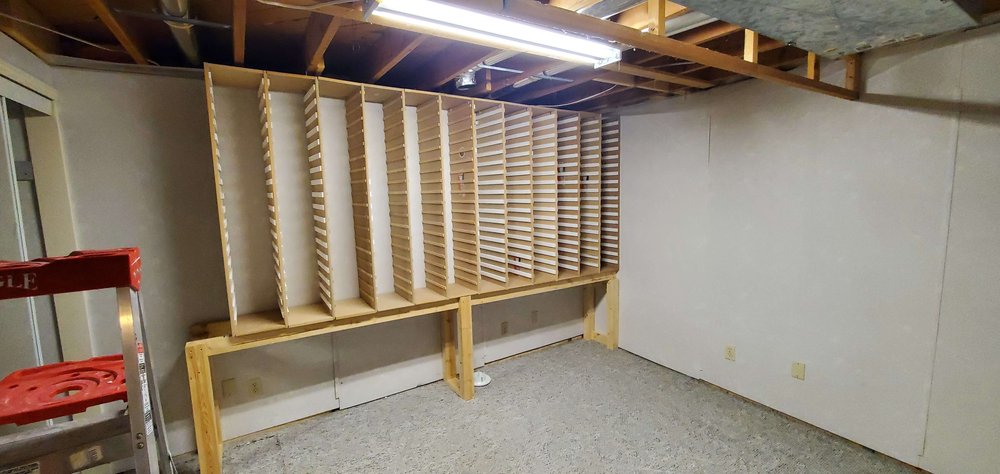
Moving any extensive LEGO collection will be rough. I use a unique storage solution called the “Degobbi System,” named after its creator Dave Degobbi to store my sorted bricks. It uses Atonius sorting trays from Ikea stored on a custom shelf system. These trays are open on top and full of pieces—and moving over 80 of these trays was nerve-racking and tedious. (I was concerned about just stacking them and placing them in a box, which I did on my third move which was thankful just a few minutes drive away.)
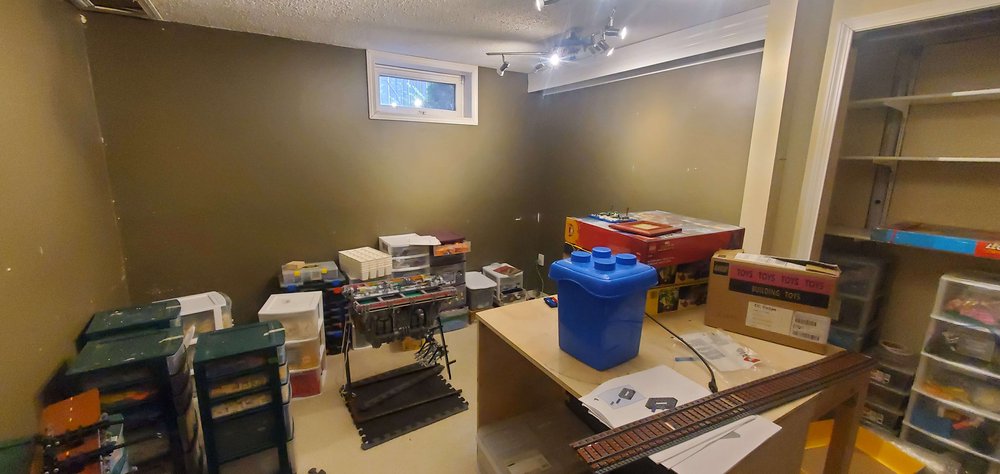
But when I moved across the country, I had to plan for an extended duration of my collection being placed in storage contain as well as a rough 2,000 km journey across the mountains and plains of Canada. So I cut 80 cardboard “lids” the size of the container and taped them to the top, then I stacked them in boxes. I’m not saying everyone’s move will have this much prep time, but if you want to unpack and set up without having to re-sort to your entire collection on arrival… PREP IS KEY!
Practical Tips for a Smooth Move
While the process may not be flawless, there are strategies and techniques that can significantly ease the burden of moving LEGO. Our expert, a former professional mover, shares invaluable tips for packing, organization, and safe transportation, including how to minimize the risk of damage, streamline your packing process, and safeguard your prized creations during transit. Meet Ray, who shares the following:

“When we decided to upgrade our house, one of our considerations was, of course, the LEGO room. We got our realtor on board right away with keeping the LEGO room in mind when looking at new houses. We sold our house before we managed to find a new house. All of our stuff had to be packed up and put into storage. Ultimately, our stuff stayed in a storage trailer for about six months.
Both my wife and I are former professional movers and packers. We had a very good idea about how to pack our collection. I can honestly say we had great success.
Some essential supplies included the following:
Plastic bags (Garbage bags of various sizes, grocery bags, freezer bags.)
A lot of moving tape (You can never have too much.)
Packing paper (We bought bundles from a moving company. You can also use newspaper/flyers but the ink may rub off onto your items.)
New cardboard boxes (New boxes are stiff and strong. Used boxes tend to be a little softer and run the risk of collapsing under load.)

Large Plastic Drawers (like Sterilite drawers)
Empty each drawer into a grocery bag or freezer bag, tie the bag tight, and put it back into the drawer. Then put the drawer set into a garbage bag. Using the tape, go around each drawer to keep the drawer shut, then go over the top and under the bottom to help keep the drawer units themselves together. Plastic wrap can also be used.
Smaller Plastic Drawers
Bagging the contents of each drawer is optional (it depends on if the drawers are turned upside down could the pieces can spill out of the drawers internally), but I typically put the entire drawer set into a bag and tape it shut. Then place the drawers into a large box. Make sure that everything is tight in the box while at the same time ensuring the box isn't so full the sides are bulging. Mark on the boxes "This Way Up" on at least two sides.
Mini Drawers (like Akro Mills)
I wrapped these in packing paper and taped the paper on tight so the package was sealed like a Christmas present. Again, you can bag the contents of individual drawers if you think you will have a bumpy ride of if you can’t control the orientation of the boxes during shipping. Then these went into a box standing up. I made sure that everything was tight in the box and marked on the boxes “This Way Up.”
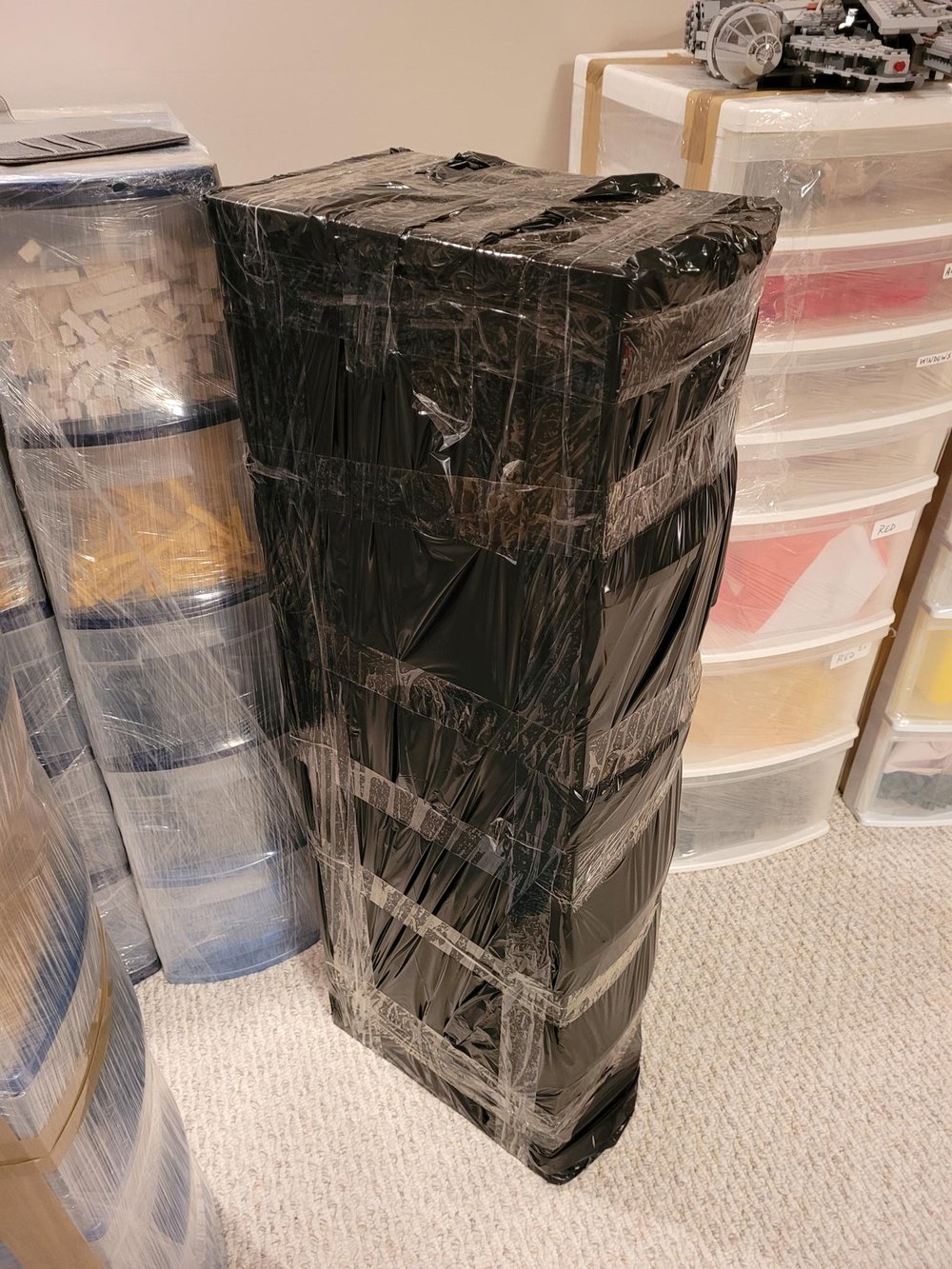
Built LEGO Sets
First, take all of the spindly bits off of the set or MOC—these include everything thank will likely break off under normal movement and are quite obvious. Put the spindly bits into ziplock bags. If possible, I'd stick the bag of bits inside the big chunks of the set/MOC when possible to keep them contained. Large chunks go into a size-appropriate bag. You can get fancy and vacuum the air out of the bag. Then use tape to secure the bag. Some folks will use a stretch wrap (like Saran wrap) but I find that time-consuming.
Then the sets can go into a box. Wrapping chunks in bubble wrap is also an option (higher cost) but not absolutely necessary. For smaller builds, I'd pack those into shoe boxes or wrap them in paper and pack them into boxes.
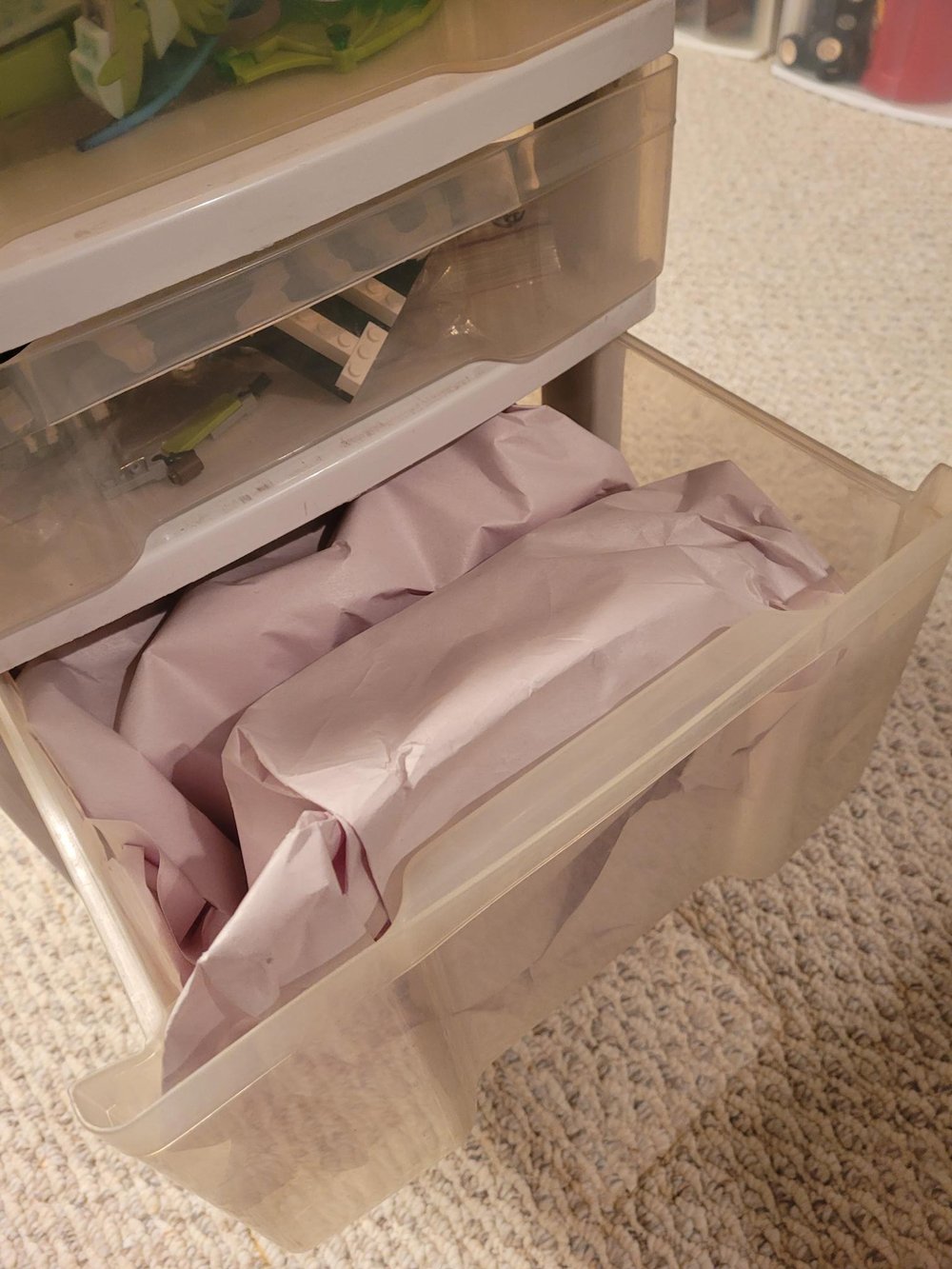
Packing Boxes
Wad up some packing paper into loose balls and line the bottom of the box. Cover the layer of balls with a flat sheet of paper and then add your items. Repeat if you are doing multiple layers in a box. Wad up balls of paper to fill in gaps around your items. The balled-up paper acts like a shock absorber for your packed items.
When wrapping something in paper, don't wrap it tight. You want the item to seem a little "poofy." The poofiness provides the cushion needed to help prevent breakage.”
Going the Extra Mile: International Moves
For those embarking on international journeys here is AFOL extraordinaire Boone talking about his international move to Denmark and what he chose to do with his LEGO collection in preparation for the move. Surprisingly, that was not bringing the majority of his collection, but instead focusing on the most important aspects:

Boone didn’t have any photos, so this is the build room from Bill Vollbrecht, another AFOL-turned designer who pacKed up his entire collection for the move to another continent.
“I used the international move as an excuse to get as close to a full reset as possible. I gave away something like 75 sealed sets, most of which were given as prizes to viewers in an event on my YouTube channel. I only brought about a dozen sets spanning childhood to now. I selected the ones that were absolutely most important to me like the Black Seas Barracuda I’ve had since I was 6, a low-numbered copy of my Antique Fire Engine from the BrickLink ADP, Jake Sadovich’s #2 copy of his Ship in a Bottle Ideas fan model, and stuff like that.
I also packed one small box with the tiny things that are just super precious to me, like specially printed bricks and a few minifigs that are high in value, either monetary or sentimental. I also brought all my monorail track and components, as it’s a quantity that would take years to accumulate again at any reasonable cost.
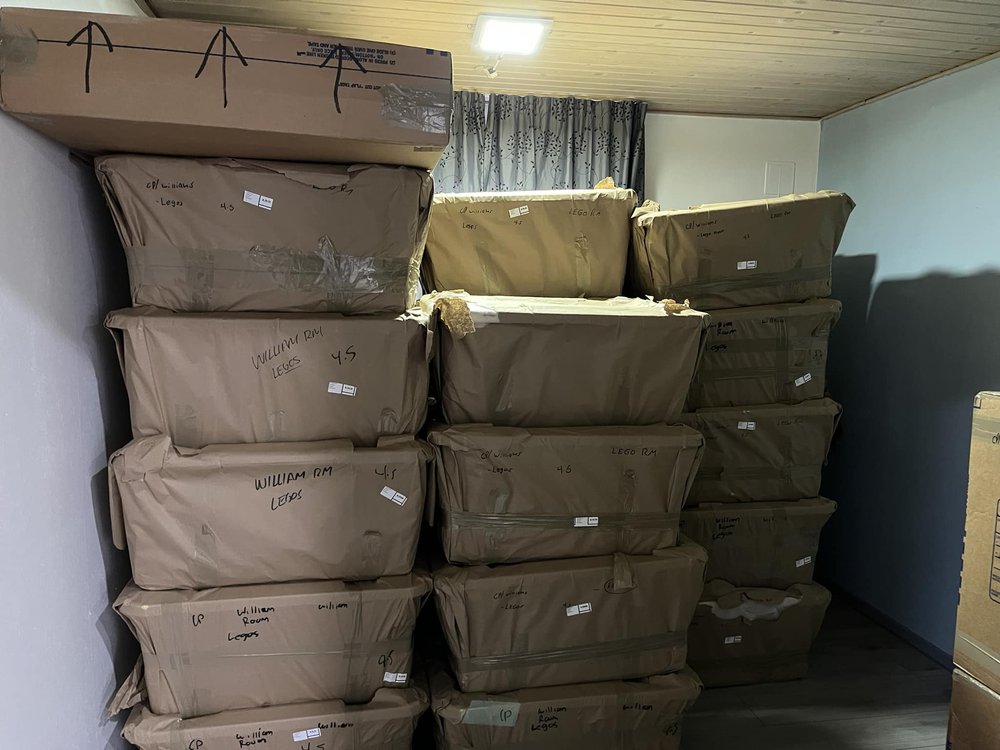
How bill’s collection was packaged up and arrived after sailing accross the Atlantic Ocean.
I also had a garage sale and invited a bunch of local AFOLs. I sold and gave away assembled sets from my childhood to recent years, MOCs from my childhood to recent years, a parts library that I estimate had something around 400k sorted elements (and at least as many more unsorted), build tables and storage drawers as well other random LEGO items. It was such an incredible event! I think about 120 people came. I wanted to move the stuff and I wanted my friends and acquaintances to feel great about what they got, so everybody got free stuff and I tried to give great deals on the items that sold.

Bill starting the process of unpacking his LEGO collection after the move.
After about four hours, pretty much everything was gone and I had quite a bit of extra cash to help with the move. I dug far deeper into letting go than I ever thought I would, but knowing all that stuff is spread out, now part of a bunch of other people’s collections, it almost means more to me than having had it all. I had never moved my collection before, so that’s my story.”
Moving On
While moving LEGO remains a complex and potentially nerve-wracking task, I hope this article provided you with a sense of camaraderie, expert advice, and a dose of inspiration. As AFOLs, our LEGO creations hold sentimental value beyond measure, and it's natural to approach the process with a mixture of caution and determination. By embracing the challenges, learning from others' experiences, and implementing practical tips, you can navigate the stressful moving process with greater confidence to ensure that your cherished LEGO collection continues to bring joy in its new location—wherever you may move.
Have you had to move your LEGO collection? What additional tips would you share? Let us know in the comments below.
Do you want to help BrickNerd continue publishing articles like this one? Become a top patron like Charlie Stephens, Marc & Liz Puleo, Paige Mueller, Rob Klingberg from Brickstuff, John & Joshua Hanlon from Beyond the Brick, Megan Lum, Andy Price, John A., Lukas Kurth from StoneWars, Wayne Tyler, LeAnna Taylor, Monica Innis, and Dan Church to show your support, get early access, exclusive swag and more.

